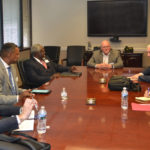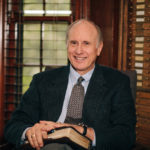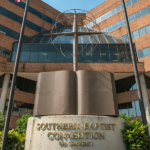NASHVILLE (RNS)—Pressure continues to build on the Executive Committee of the Southern Baptist Convention to allow a third-party firm full access to investigate how it has handled allegations of sexual abuse over the past 20 years.
All six Southern Baptist seminaries expressed their dismay at the Executive Committee’s unwillingness to act.
“From my vantage point, the present situation is inexcusable and unacceptable,” Adam W. Greenway, president of Southwestern Baptist Theological Seminary in Fort Worth, tweeted on Sept. 28, after the Executive Committee declined to waive attorney-client privilege in the probe for the second time in as many weeks.
“This is beyond disappointing and potentially damaging to the trust essential to the SBC,” tweeted Daniel Akin, president of Southeastern Baptist Theological Seminary in Wake Forest, N.C.
Trustees of the Baptist State Convention of Michigan passed a resolution Sept. 29 calling on the Executive Committee to “fully abide” by the wishes of delegates, called messengers, calling for an investigation. The statement said it stood with survivors of sexual abuse “in an unyielding desire to see justice accomplished.”
The following day, a group of 25 South Carolina pastors issued a statement, saying that if the Executive Committee does not comply, they will consider reallocating their donations away from the Executive Committee. It was followed by a group of 32 Texas pastors who implored the committee to waive privilege.
The SBC Hispanic Council also urged the Executive Committee “to comply with the clear and precise directive that was approved, almost unanimously, by the messengers” to the SBC annual meeting.
“This includes that the task force direct the investigation, that the Executive Committee waive attorney-client privilege in order to have a transparent investigation, and that the task force’s report be made public,” the council stated. “We believe that our God will bless the transparency and unity of is people in our family of Baptist churches.”
Members of the Executive Committee have insisted they must shield certain communications from investigators despite the express wishes of Southern Baptists, whose chosen representatives voted in June to allow a transparent investigation of how the Executive Committee has handled sexual abuse.
Sign up for our weekly edition and get all our headlines in your inbox on Thursdays
A motion passed by messengers to the SBC annual meeting in June ordered the creation of a task force to oversee the hiring of an outside investigator and explicitly called on the Executive Committee to waive attorney-client privilege as it relates to communications between the denomination, its lawyers and sex abuse victims.
Struggling to deal with sexual abuse
The denomination has been roiled for more than a decade by its members’ attempts to reckon with sexual abuse, including a push to establish a national database of known abusers. In 2020, the delegates to the annual meeting approved procedures for expelling churches that knowingly hire abusive clergy.
The Executive Committee’s response has long been to argue that the denomination’s bottom-up structure—where local churches choose their own clergy and govern their affairs—means that national Baptist entities are not responsible for the actions of abusive clergy.
In 2019, D. August “Augie Boto,” a former interim president of the Executive Committee and longtime staffer, said in an email that abuse advocates were part of “a satanic scheme to completely distract us from evangelism.”
The issue was brought to a head when an extensive investigation published that year by the Houston Chronicle and San Antonio Express-News revealed about 380 Southern Baptist church leaders and volunteers had faced allegations of sexual misconduct.
Earlier this year, leaked letters and secret recordings revealed the Executive Committee was slow to address sexual abuse, mistreated survivors and was generally more concerned with donations than with finding justice for the victims.
Autonomy an issue
The crisis over waiving attorney-client privilege strikes at the heart of how the denomination, the largest Protestant group in the United States, is run. Southern Baptists have no bishops and are governed by the will of messengers who meet once a year to conduct the denomination’s business. When the convention is not in session, the Executive Committee handles its affairs on behalf of the messengers.
But the Executive Committee, and its president and CEO, Ronnie Floyd, insist the messengers’ motion does not bind them on the issue of attorney-client privilege.
“We are confident that the intent of the messengers to the 2021 annual meeting can be accomplished without risking unnecessary damage to the Southern Baptist Convention,” the Executive Committee said in a statement Thursday.
The members who oppose waiving privilege seem to be acting on the advice of the group’s lawyers, who have counseled the group not to allow investigators access to sensitive communications.
Legal concerns
During a contentious five-hour meeting on Sept. 28, several of the 86 members of the committee argued that they risk costly lawsuits if they were to waive attorney-client privilege. Specifically, some said, the denomination’s insurance carrier might not pay damages if the privilege were waived and a court awarded damages to a sex abuse survivor.
At least four of the Executive Committee’s members are lawyers; all four are opposed to waiving attorney-client privileges.
Others on the committee, including its chairman, El Cajon, Calif., pastor Rolland Slade, are willing to give up attorney-client privilege. So, too, is SBC President Ed Litton, an ex-officio member of the Executive Committee.
The seven-member task force, led by Bruce Frank, a North Carolina pastor, acknowledged that waiving privilege may hold legal risks.
“Both our attorneys and the (Executive Committee) attorneys confirmed that any waiver of privilege at any time does create the risk that in a lawsuit related to a case where privilege is waived, the insurance company could argue that they are discharged from paying the judgment in that case due to waiver,” the statement said.
But the statement added: “It is impossible to follow the will of the Messengers and avoid this risk.”
Many Southern Baptists believe the potential risk of legal liability is worth it if the ultimate goal is to do justice to the victims.
“If we’ve done some things wrong that require restitution, then we need to make restitution,” said Akin, the seminary president. “If we’ve done things wrong and need to apologize, then apologize. We need to do the right thing for the right reasons and live out the faith we profess and trust that the Lord will provide for us and bless us if we do what is right.”
The Executive Committee is expected to meet again Oct. 5.
EDITOR’S NOTE; This article originally was posted on Sept. 30. It was edited Oct. 1 to include additional information.













We seek to connect God’s story and God’s people around the world. To learn more about God’s story, click here.
Send comments and feedback to Eric Black, our editor. For comments to be published, please specify “letter to the editor.” Maximum length for publication is 300 words.